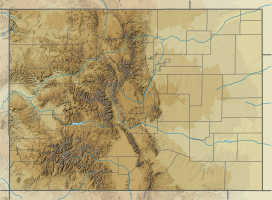Pagosa Peak
| Pagosa Peak | |
|---|---|
 The mountain (center) in October 2024 | |
| Highest point | |
| Elevation | 3,858 m (12,657 ft)[1] |
| Prominence | 1,021 ft (311 m)[2] |
| Isolation | 4.37 mi (7.03 km)[2] |
| Coordinates | 37°26′38.22″N 107°3′59.73″W / 37.4439500°N 107.0665917°W |
| Geography | |
| Location | Archuleta County, Colorado |
| Country | United States |
| State | Colorado |
| County | Mineral |
| National Forest | San Juan National Forest |
| Wilderness Area | Weminuche Wilderness |
| Parent range | San Juan Mountains of the Southern Rocky Mountains[2] |
| Topo map(s) | USGS Pagosa Peak |
Pagosa Peak, elevation 12,658 feet (3,858 meters), is a summit in the San Juan Mountains in Mineral County, Colorado, north of Pagosa Springs.[1] The mountain lies in the Weminuche Wilderness and the San Juan National Forest. Pagosa Peak is visible from Pagosa Springs and serves as a landmark.
Hiking
The climb to the top of the peak is difficult, as is accessing the trailhead, especially in a two-wheel drive vehicle. There is no official Forest Service trail to the peak, but a social trail has been formed by countless hikers. The unsigned trail is about four miles (6.4 kilometers) long with an elevation gain of around 2,500 feet (760 meters). Numerous fallen trees cross the path, which is not maintained. The trail is steep, navigation is difficult, and a false summit may cause confusion.[3][4]
Pagosa Peak Dacite
Pagosa Peak Dacite, a type of pyroclastic rock that originated in the La Garita Caldera, is named for the peak.[5]
References
- ^ a b "Pagosa Peak". Geographic Names Information System. United States Geological Survey, United States Department of the Interior. Retrieved October 12, 2024.
- ^ a b c "Pagosa Peak". Peakbagger. n.d. Retrieved October 12, 2024.
- ^ "Pagosa Peak". This is Pagosa. Retrieved October 12, 2024.
- ^ "Pagosa Peak". South San Juans. Retrieved October 12, 2024.
- ^ Bachmann, Olivier; Dungan, M. A.; Lipman, P. W. (2000). "Voluminous lava-like precursor to a major ash-flow tuff: Low-column pyroclastic eruption of the Pagosa Peak Dacite, San Juan volcanic field, Colorado". Journal of Volcanology and Geothermal Research. 98 (1–4): 153–171. doi:10.1016/S0377-0273(99)00185-7.

